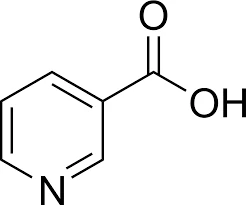
Niacin, also known as vitamin B3, is a powerhouse nutrient that plays a crucial role in supporting overall health and fitness. From an athletic perspective, niacin stands out as an essential component for those seeking to optimize their physical performance and well-being.
One of the most significant benefits of niacin for fitness enthusiasts is its role in energy production. As a key player in the conversion of food into usable energy, niacin ensures that our bodies have the fuel necessary to power through intense workouts and daily activities. This energy-boosting property is particularly valuable for athletes and active individuals who require sustained stamina during training sessions or competitions.
The impact of niacin on energy metabolism extends beyond just providing fuel. It aids in the breakdown of carbohydrates, fats, and proteins, allowing our bodies to efficiently utilize these macronutrients. This efficient nutrient utilization is crucial for maintaining optimal energy levels throughout workouts and supporting overall physical performance.
For those focused on cardiovascular health, niacin offers promising benefits. Its potential to improve blood lipid profiles by increasing HDL (good) cholesterol and reducing LDL (bad) cholesterol and triglycerides is particularly noteworthy. This effect on cholesterol levels can contribute to better heart health, which is essential for maintaining a robust cardiovascular system capable of supporting intense physical activities.
Niacin’s ability to promote vasodilation and improve blood flow is another aspect that makes it valuable in a fitness context. Enhanced blood circulation ensures that oxygen and nutrients are efficiently delivered to working muscles during exercise. This improved blood flow can lead to better endurance, delayed onset of fatigue, and potentially improved exercise performance.
Recovery is a critical component of any fitness regimen, and niacin plays a supportive role in this aspect as well. Its involvement in DNA repair and synthesis contributes to muscle regeneration and growth, which is essential for recovery after intense workouts. Additionally, niacin’s anti-inflammatory properties can help reduce exercise-induced inflammation, potentially alleviating post-workout muscle soreness and enhancing overall recovery.
The potential cognitive benefits of niacin are also relevant to fitness enthusiasts. Improved brain function and mental clarity can contribute to better focus during workouts, enhanced mind-muscle connection, and improved overall athletic performance. The role of niacin in supporting cognitive health may also help in maintaining mental sharpness and potentially protecting against age-related cognitive decline, which is beneficial for long-term health and fitness goals.
Skin health is another area where niacin shines, which is particularly relevant for those who spend a lot of time outdoors or in harsh gym environments. Its ability to support skin barrier function and potentially aid in protecting against sun damage can be beneficial for athletes who train outside. Healthy skin is not just about aesthetics; it’s an important aspect of overall health and can contribute to a more comfortable workout experience.
For individuals concerned about blood pressure, niacin’s potential to help lower blood pressure levels is an added benefit. Maintaining healthy blood pressure is crucial for overall cardiovascular health and can contribute to better exercise performance and recovery.
The digestive benefits of niacin are often overlooked but are particularly important for athletes and fitness enthusiasts. A healthy digestive system ensures proper nutrient absorption, which is crucial for fueling workouts and supporting recovery. Niacin’s role in maintaining a healthy gastrointestinal tract can contribute to better overall nutrition and, consequently, improved fitness outcomes.
It’s worth noting that while niacin offers numerous benefits, it’s important to obtain it through a balanced diet or under the guidance of a healthcare professional if considering supplementation. Foods rich in niacin include lean meats, fish, nuts, and fortified grains, making it relatively easy to incorporate into a healthy, fitness-focused diet.
For those engaged in intense training regimens, the potential of niacin to preserve muscle glycogen is particularly exciting. By potentially helping the body utilize carbohydrates more efficiently and delaying the breakdown of muscle glycogen, niacin may contribute to prolonged endurance during workouts. This glycogen-sparing effect could be especially beneficial for endurance athletes or those engaged in high-intensity interval training.
The holistic benefits of niacin align well with a comprehensive approach to fitness and health. Its diverse roles in energy production, cardiovascular health, recovery, cognitive function, and overall well-being make it a valuable nutrient for anyone committed to a healthy and active lifestyle.
In conclusion, niacin stands out as a versatile and powerful ally in the pursuit of fitness and health goals. Its multifaceted role in supporting energy production, cardiovascular health, recovery, and overall well-being makes it an essential nutrient for those looking to optimize their physical performance and maintain long-term health. By embracing a diet rich in niacin and other essential nutrients, individuals can lay a strong foundation for their fitness journey, supporting their bodies in meeting the demands of regular exercise and an active lifestyle. As we continue to explore the intricate relationships between nutrition and physical performance, niacin remains a shining example of how a single nutrient can contribute significantly to multiple aspects of health and fitness, empowering individuals to reach new heights in their wellness pursuits.
Need your own dietary supplement manufacturer? Extremely competitive rates. We produce it all. Talk to us.
Comments are closed